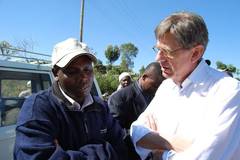Reflections by Prelate Dr Stephan Reimers
Prelate Dr Stephan Reimers, member of the board of the Church Development Service EED and representative of the Evangelical Church in Germany (EKD) and EKD's to the European Union, Germany, was part of the Living Letters solidarity team sent to Kenya by the World Council of Churches (WCC) from 30 January to 3 February 2008.
Read his personal reflections on this experience:
In the face of the chaotic situation prevailing in an African country so far considered to be particularly stable, the world Council of Churches sent a delegation to Kenya from 30th of January to 4th of February 2008 of which I was a member representing the EKD. Aim of this visit was to show compassion with the victims and concern for the future development by our presence and spiritual communion in worship, prayer and conversation. The WCC described the mission as a "Living letter" - 2. Cor. 3:3.
"You show that you are a letter from Christ,
the result of our ministry, written not with ink
but with the Spirit of the living God,
not on tablets of stone but on tablets of human hearts."
The Role of the Churches in the Present Conflict
Our coming was received gratefully and understood as a strengthening ("in such a time only real friends are coming"). An important topic was the attitude of the churches, of which 80 % of the population are members, within the political struggle. Here became apparent, that much church siding with both conflicting parties had taken place, depending on the ties to one of the 42 tribes.
A member of the Kikuyu-tribe, having dropped his position as general secretary of the National Council of Churches last year, had been elected as representative of the governmental party.
His successor Rev. Canon Peter Karanja has set himself the goal to take a position in equidistance to both parties. This attitude was noticeable during the conversations, we had with the leaders of the governmental party PNU - Party of National Unity - and the opposition ODM - Orange Democratic Movement. The politicians regretted the role the churches were playing. They needed healing, too. During the election campaign there had been a PNU and an ODM church.
Peacekeeping Efforts of the Churches
The day before our arrival the National Council of Churches had invited the bishops of the tribes mainly involved in the fights - Kikuyu und Kalenjin - to a day-long meeting. Rev. Karanja reported about a serious and open exchange, which was concluded in a common ceremony of mourning on 15th of February in the district of Eldoret. It was the area where a church had been burnt down to which people had fled.
Our delegation stayed for two days in the border area of both enemy tribes in the rift-Valley province, the "bread-basket of Kenya". We saw the burnt down houses, shops and schools and talked to the Kikuyus, who had not fled. At night some 600 women, men and children camped in a big schoolroom - guarded by the warriors of their tribe. The second day we drove with the Kikuyu-chief and pastors to the bordering district of Kalenjin. It was the first meeting of the neighbours after the murdering and looting. Accordingly the atmosphere war tense and many attempts of justification were uttered by the Kalenjin speakers. The governmental party was said to have tampered with the election results. Peace was only possible with Odinga as president. The chief of the Kikuyu village objected: "You have killed innocent people who didn't have anything to do with the elections." When one of our companions called them to put their trust in Christ alone, there were angry replies from the group of the young Kalenjin: justice, justice! At least at the end there was made an appointment for another meeting on neutral ground.
Causes for the Conflicts
Of the 42 Kenyan tribes there are three bigger and political dominating ones: Kikuyu (22%), Luo (15%) and Kalenjin (12%). President Kibaki is Kikuyu, opposition leader Raila Odinga a Luo who holds an alliance with important Kalenjin politicians.
One member of our delegation, the Lutheran Bishop Laiser from Tanzania, told us about the 123 tribes of his country. There they have an unwritten law that the president is elected from the group of minor tribes.
The struggle in the devastated border area aims at redistributing the land and has historical origins. When after the Kenyan declaration of independence the white farmers left the country, the land was offered for sale. The Kikuyus were quick, founded land-achieving associations and handed plots on to landless families of their tribe. Then the freedom fighters and leaders around Kenyatta managed to secure big farms for themselves. What did not cause a heavy crisis then has become a big problem now after the population has multiplied four times within the past 40 years and the young Kalenjins are looking for land which would enable them to found families (justice!). Starting out with the present birth rate, the number of inhabitants in Kenya is going to double within the next 20 year to 70 Million people. Though the country is nearly twice as big as Germany, only a fourth of its land can be used agriculturally. Of this land 75% of the inhabitants draw their existence. So real estate becomes the disputed point. Kalenjin politicians like William Ruto had been announcing during the election campaign already, that after election there would be a clean-up'. So when Kibaki was prematurely announced to be winner of the election the matter was clear for the Kalenjins: Earlier they stole the land, now they are stealing the victory of the election. The direct action with torches and machetes against the neighbours followed.
The election campaign program of the ODM contains, besides the promise of a complex land reform (i.e. penalty tax for uncultivated land), further political demands, which threaten ownership and dominance of the Kikuyus and the political establishment. Therefore the struggle for power in Nairobi is hard. Neither our conversation with opposition leader Odinga nor the meeting with the vice president Kalonzo Musyoka showed any room for a compromise.
All hope is directed to the negotiation committee chaired by Kofi Annan. If during the next 10 days no break through will take place, the chaotic situation will remain the same in many parts of the country or will increase and an economic and social downhill trend is going to start. Among the victims would be the many social projects, supported by foreign developmental organisations. For the EED Kenya is a country of main emphasis. The cooperation concentrates on fields like rural development, health (including HIV/AIDS) and the strengthening of social backup systems as well as lobbying for democratization, responsible governmental leadership, human rights and access to social services.
More information on the Living Letters visit to Kenya
National Council of Churches in Kenya
Background information on the Living Letters visits




